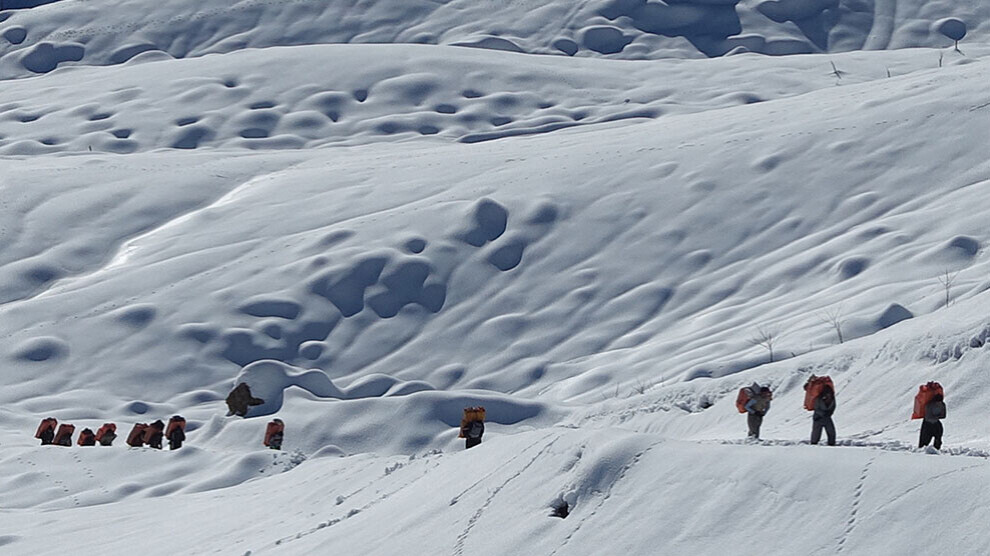A life on the brink of death for kolbars
Kurdish load carriers live with the threat of death. "To save ourselves from torture and death, we have to overcome four to five ambushes," tells kolbar M.S.
Kurdish load carriers live with the threat of death. "To save ourselves from torture and death, we have to overcome four to five ambushes," tells kolbar M.S.

The kolbars make a living by bringing loads across the dangerous borders in Kurdistan. These are mainly cigarettes, cell phones, blankets, household goods, tea, and rarely alcohol. The routes across the sealed-off borders of the nation-states that claim Kurdistan are at least as life-threatening for the kolbars as working in high mountain conditions. The Iranian military, the "Revolutionary Guard" (Pasdaran), and the Turkish army repeatedly set ambushes and kill kolbars. Kolbar M.S. spoke to ANF about his life and work.
M.S. states that from the Tete area in Eastern Kurdistan, Southern Kurdistan can be reached in one and a half hours on foot. From there, mainly televisions, packages and cigarettes are brought to Iran. The return journey with the goods takes about four hours. The lightest load, even for physically weak kolbars, is 30 kilograms and can reach 45 to 50 kilograms. On routes where there are no ambushes by the military, the weight is 50 kilograms. In case of ambushes, the weight ranges from 25 to 35 kilograms. In the case of an ambush, kolbars may have to hide in the field for ten hours.
Torture or murder by security forces
The majority of the kolbar routes run through the south of Eastern Kurdistan. There are very many kolbars in places like Ilam, Kermanshah, Loristan and Urmia, as well as in Sine, Hawraman and Sardasht. M.S. from Mariwan tells what kolbars are threatened with if they fall into the Pasdaran's trap: "If someone is caught in the first moments of an ambush, these kolbars are severely tortured, insulted and everything imaginable is done to them. Then they make the kolbars take their burden back on their backs to their military base. Of course, this is much more difficult after the torture. If you put your load down and leave, then the goods fall into their hands. Sometimes they burn what they can't bring to the base. Sometimes they start shooting already at the border, so the kolbars have to return to Southern Kurdistan."
Four to five ambushes on one route
M.S. says that Iranian soldiers sometimes advance as far as two or three kilometers into Southern Kurdistan territory and set ambushes there. "If we overcome this ambush, we get to Rojhilat. The border guards have their own ambushes again and so do the Pasdaran. Again and again they open fire at random. There are sometimes families having picnics. So there may be people other than us there. But they don't care about that. They shoot wildly. Until we reach our destination, we have to overcome four to five ambushes," he explains.
Conditions are getting tougher
M.S. talks about the difficulties of life as a kolbar, saying, "In the past, we didn't have to walk so far. Some places were ten minutes away, others twenty. But the state has built walls there. Now we can't use the easy routes. The Tete region is mountainous and rugged. There are deep ravines. Again and again, kolbars fleeing ambushes fall and break their hands and legs. Some fall and die."
No choice but to risk life
Asked why he was a kolbar, M.S. replied; "We have to do this to survive. We have children. Sometimes we don't even have bread to eat. We live in a crisis situation, but they don't even allow us to be kolbars. All the kolbars are poor. They are knee-deep in unemployment. The state has no projects for the unemployed. The poor have to work as kolbars and if they do, they are killed by the state."
RELATED NEWS: